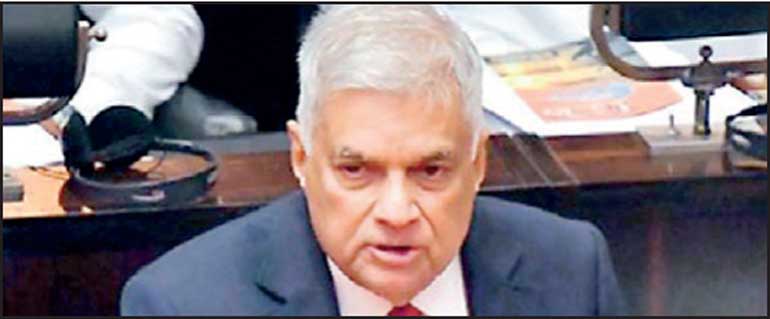Saturday Feb 21, 2026
Saturday Feb 21, 2026
Wednesday, 13 December 2023 00:34 - - {{hitsCtrl.values.hits}}
 President Ranil Wickremesinghe yesterday in Parliament endeavoured to appease the local IT and digital service companies saying export of services earning foreign exchange will be exempted from tax though the local supply will be subject to 18% VAT from 1 January.
President Ranil Wickremesinghe yesterday in Parliament endeavoured to appease the local IT and digital service companies saying export of services earning foreign exchange will be exempted from tax though the local supply will be subject to 18% VAT from 1 January.
Local digital services companies are irked by the fact that whilst they are subjected to higher VAT, foreign firms offering the same services won’t be taxed.
The President however assured the IT sector of Government support. “The increased VAT revenue, estimated at Rs. 1.5 billion (from the IT sector), will be earmarked for research initiatives, including a substantial allocation for AI research,” the President revealed.
He told Parliament that supply of IT services was liable to VAT until 31 December 2019 and was exempt from VAT only from 1 January 2020.
“Even in India, the GST rate for all kinds of IT software supply services products are 18%. Now, we have decided as a policy to impose increase the VAT up to 18%. Then it must apply to all sectors. You can’t exempt some sectors and others,” the President said in his address.
The President’s Media Division in its statement said, “In a compelling address to Parliament Wickremesinghe outlined a ground-breaking vision for Sri Lanka’s future, emphasising the importance of the digital sector in propelling the nation’s economic growth.”
“The President addressed concerns raised by the IT industry regarding VAT implications and announced a strategic shift towards fostering research and development,” PMD added.
President Wickremesinghe stressed the need for a robust science and technology foundation, announcing the establishment of the Digital Transformation Agency, AI Centre and Digital Technology and Innovation Council. These entities will play a pivotal role in shaping policy, driving innovation and commercialising technological advancements.
Highlighting the critical role of education, the President announced plans to expand existing universities and establish new ones focused on technology and science. Cooperation with foreign partners, including the establishment of an IIT campus in collaboration with India, underscores Sri Lanka’s commitment to becoming a global technology hub.
The President also touched upon the agricultural and energy sectors, outlining plans for technological integration to boost productivity and embrace renewable energy sources. Collaborations with countries like Germany and Australia further emphasise Sri Lanka’s commitment to green technology and global partnerships.
In a bold move to attract foreign investments, President Wickremesinghe revealed upcoming changes to the investment landscape, with the replacement of the Board of Investment (BoI) and the Export Development Board (EDB) by the Economic Commission. The new structure aims to streamline investment processes and encourage international trade.
In concluding his address, President Wickremesinghe called for bipartisan support, urging both the Government and the opposition to unite in achieving a scientific and technological revolution. He expressed gratitude for the opportunity to lead the Ministry of Science and Technology once again, emphasising his commitment to steering Sri Lanka towards a brighter future.
